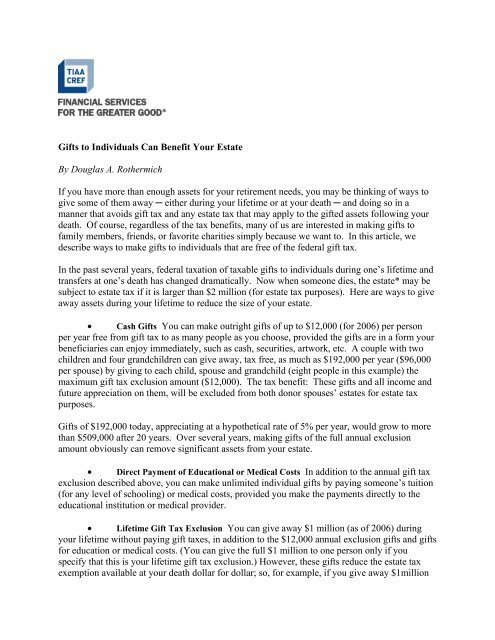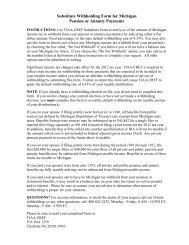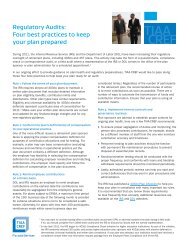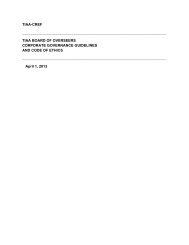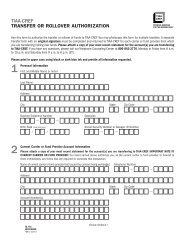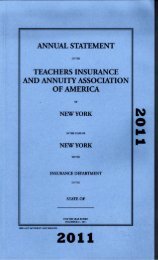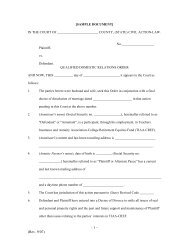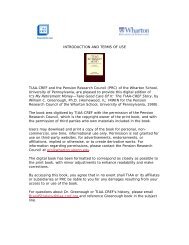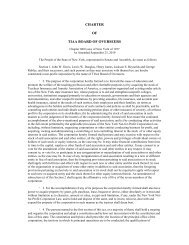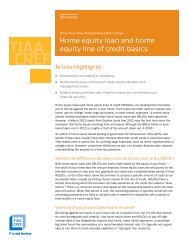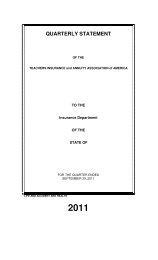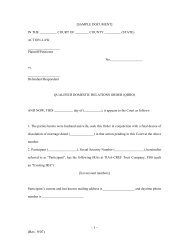Gifts to Individuals Can Benefit Your Estate - TIAA-CREF
Gifts to Individuals Can Benefit Your Estate - TIAA-CREF
Gifts to Individuals Can Benefit Your Estate - TIAA-CREF
You also want an ePaper? Increase the reach of your titles
YUMPU automatically turns print PDFs into web optimized ePapers that Google loves.
<strong>Gifts</strong> <strong>to</strong> <strong>Individuals</strong> <strong>Can</strong> <strong>Benefit</strong> <strong>Your</strong> <strong>Estate</strong>By Douglas A. RothermichIf you have more than enough assets for your retirement needs, you may be thinking of ways <strong>to</strong>give some of them away ─ either during your lifetime or at your death ─ and doing so in amanner that avoids gift tax and any estate tax that may apply <strong>to</strong> the gifted assets following yourdeath. Of course, regardless of the tax benefits, many of us are interested in making gifts <strong>to</strong>family members, friends, or favorite charities simply because we want <strong>to</strong>. In this article, wedescribe ways <strong>to</strong> make gifts <strong>to</strong> individuals that are free of the federal gift tax.In the past several years, federal taxation of taxable gifts <strong>to</strong> individuals during one’s lifetime andtransfers at one’s death has changed dramatically. Now when someone dies, the estate* may besubject <strong>to</strong> estate tax if it is larger than $2 million (for estate tax purposes). Here are ways <strong>to</strong> giveaway assets during your lifetime <strong>to</strong> reduce the size of your estate.• Cash <strong>Gifts</strong> You can make outright gifts of up <strong>to</strong> $12,000 (for 2006) per personper year free from gift tax <strong>to</strong> as many people as you choose, provided the gifts are in a form yourbeneficiaries can enjoy immediately, such as cash, securities, artwork, etc. A couple with twochildren and four grandchildren can give away, tax free, as much as $192,000 per year ($96,000per spouse) by giving <strong>to</strong> each child, spouse and grandchild (eight people in this example) themaximum gift tax exclusion amount ($12,000). The tax benefit: These gifts and all income andfuture appreciation on them, will be excluded from both donor spouses’ estates for estate taxpurposes.<strong>Gifts</strong> of $192,000 <strong>to</strong>day, appreciating at a hypothetical rate of 5% per year, would grow <strong>to</strong> morethan $509,000 after 20 years. Over several years, making gifts of the full annual exclusionamount obviously can remove significant assets from your estate.• Direct Payment of Educational or Medical Costs In addition <strong>to</strong> the annual gift taxexclusion described above, you can make unlimited individual gifts by paying someone’s tuition(for any level of schooling) or medical costs, provided you make the payments directly <strong>to</strong> theeducational institution or medical provider.• Lifetime Gift Tax Exclusion You can give away $1 million (as of 2006) duringyour lifetime without paying gift taxes, in addition <strong>to</strong> the $12,000 annual exclusion gifts and giftsfor education or medical costs. (You can give the full $1 million <strong>to</strong> one person only if youspecify that this is your lifetime gift tax exclusion.) However, these gifts reduce the estate taxexemption available at your death dollar for dollar; so, for example, if you give away $1million
during your lifetime, your estate tax exemption will drop from $2 million <strong>to</strong> $1million (for2006). Still, the full amount of the gifts and all subsequent income and appreciation are outsideyour estate.So, if you want <strong>to</strong> make very sizable gifts, you can give up <strong>to</strong> the value of your remainingexclusion amount without paying any gift tax. (<strong>Your</strong> gift tax return will apply the unused lifetimegift tax exclusion <strong>to</strong> shelter all of the gift tax.)Tax-Favored Forms of <strong>Gifts</strong>If your gift takes any of the following forms, your beneficiary will receive at least some degreeof shelter from tax on investment earnings. Also, some states offer an up-front state taxdeduction on contributions <strong>to</strong> 529 tuition savings plans.529 College Savings Plans You can contribute up <strong>to</strong> $60,000 per beneficiary ($12,000 times 5),that’s $120,000 for taxpayers filing jointly, <strong>to</strong> a 529 plan in one year without incurring thefederal gift tax. The contribution would be counted against your annual gift tax exclusion overfive years, so you would have <strong>to</strong> wait five years before making another tax-free gift of any type<strong>to</strong> that particular beneficiary. If you are single with 10 grandnieces and nephews, for example,you could immediately transfer $600,000 ($60,000 times 10) out of your federal taxable estate inthis way. A couple with 10 beneficiaries could transfer out $1.2 million. For more informationon 529 College Savings Plans, call 888 381-8283; for the Independent 529 Plan (for privateschools), call 888 718-7878.UGMAs/UTMAs For gifts <strong>to</strong> a minor beneficiary (a child or grandchild, for example), the simpleapproach is <strong>to</strong> open a cus<strong>to</strong>dial account under your state’s Uniform <strong>Gifts</strong> <strong>to</strong> Minors Act orUniform Transfers <strong>to</strong> Minors Act (UGMA or UTMA) and fund it with mutual funds or similarinvestments. This avoids the cost and complexity sometimes associated with establishing a trustand generally makes sense when gifts are relatively small.A possible disadvantage of using cus<strong>to</strong>dial accounts is that the assets will belong <strong>to</strong> the minorbeneficiary when he/she reaches the age of majority (typically 18 or 21, depending on yourstate’s law), without any restrictions. If a gift <strong>to</strong> a cus<strong>to</strong>dial account makes sense in yoursituation, you should avoid serving as cus<strong>to</strong>dian for any account that you establish. Doing sowould cause the assets <strong>to</strong> be included in your estate for estate tax purposes if you die before yourbeneficiary reaches the age of majority. For more information on UGMAs/UTMAs call 800842-2776.Trusts If you are making a large gift or plan <strong>to</strong> make a series of gifts that will potentially grow <strong>to</strong>a substantial amount in time, placing the gift in trust can provide a number of benefits for youand your beneficiary. You can direct when and how your beneficiary may use the assets. Aprofessional trustee can be appointed <strong>to</strong> provide long-term asset management of the gifted assets.And the gifted assets may be protected from credi<strong>to</strong>rs. Establishing a trust usually involveshaving an at<strong>to</strong>rney draft the trust document, then giving the assets <strong>to</strong> the trustee <strong>to</strong> manage. Thetrustee can be an individual or a corporate trustee like <strong>TIAA</strong>-<strong>CREF</strong> Trust Company, FSB, orboth. For information about Trust Company services, call 888 842-9001.
Will You Owe <strong>Estate</strong> Taxes?For 2006, your estate will be subject <strong>to</strong> estate tax only if the net taxable portion is greater than $2million (reduced by any taxable gifts made during your lifetime). <strong>Your</strong> taxable estate willtypically be reduced by any amount you leave <strong>to</strong> your spouse or <strong>to</strong> charity. If you are receivingincome from a <strong>TIAA</strong>-<strong>CREF</strong> life annuity, only the value of the remaining annuity payments atyour death (that is, the value of your joint annuitant’s remaining interest, if any, or the value of aguarantee period) will be included in your taxable estate.*<strong>Your</strong> estate comprises all your assets, including investments, real estate and personal belongings.This tax information is not intended <strong>to</strong> be used and cannot be used by any taxpayer for the purpose of avoiding taxpenalties. It was written <strong>to</strong> support t his article. Taxpayers should seek advice based on their own particularcircumstances from an independent tax advisor.Douglas A. Rothermich, J.D., is Vice President, Wealth Planning Strategies, for <strong>TIAA</strong>-<strong>CREF</strong>’s WealthManagement Group. Wealth Management Group services are provided by Advice and Planning Services, aregistered investment advisor and a division of <strong>TIAA</strong>-<strong>CREF</strong> Individual & Institutional Services, a registeredbroker/dealer, member NASD, SIPC.C35555


